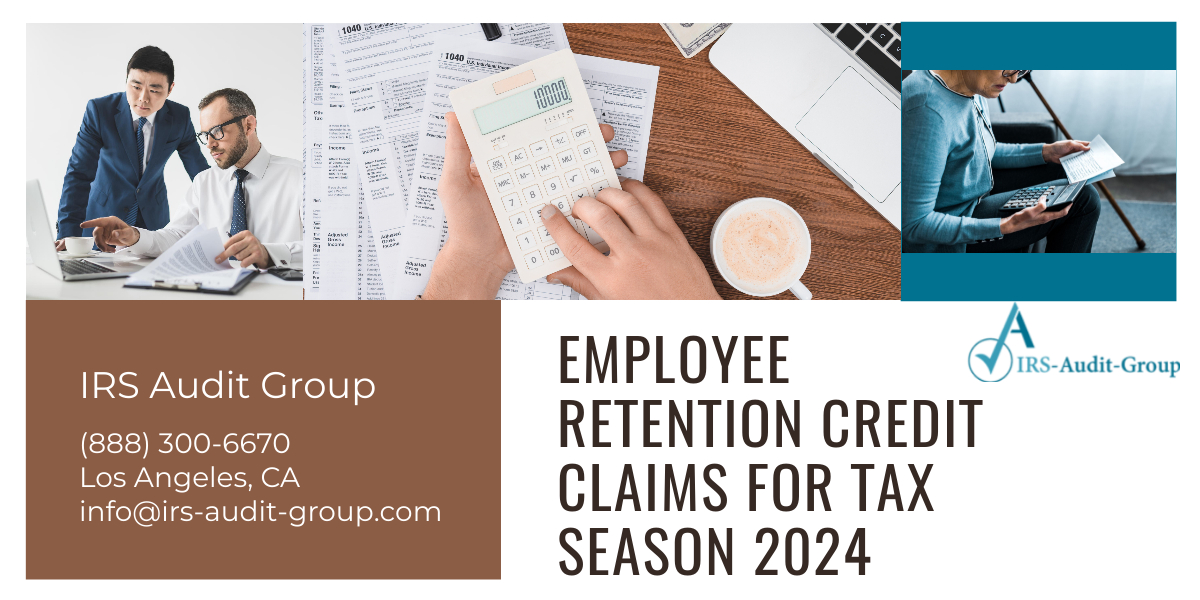The Employee Retention Credit (ERC), or the Employee Retention Tax Credit (ERTC), is a tax credit scheme available to eligible businesses and tax-exempt organizations. Its purpose was to encourage businesses to retain their employees amidst the challenges posed by the COVID-19 pandemic.
Who is eligible?
Employers who qualify can access the credit if they have paid qualified wages to their employees between March 12, 2020, and January 1, 2022. The eligibility criteria and the amount of credit that can be claimed depend on the timing of the business impacts. It’s important to note that the Employee Retention Credit (ERC) is specifically designed for businesses and is not available to individuals.
How much is the credit?
The ERC for Tax Season 2024 is determined by taking a percentage of the qualified wages disbursed to employees. To calculate the credit, the maximum limit for qualified wages per employee is set at $10,000 for each calendar quarter. This means that any wages exceeding this amount will not be considered when determining the credit.
New Changes in ERC Claims for Tax Season 2024
- Businesses that initially received Paycheck Protection Program (PPP) loans were not eligible for the Employee Retention Credit (ERC). However, new legislation now permits these businesses to retroactively claim the ERC for wages not covered by forgiven PPP loan funds.
- Originally, the ERC was limited to businesses facing operational suspensions or revenue declines. Recent changes now allow businesses affected by COVID-19-related closures or reduced hours to qualify for the credit.
- The credit limit for each employee has been raised to a higher amount.
IRS Issues 7 Warnings For Incorrect Claims
Despite its initial intent to offer essential economic support to employers facing financial challenges due to COVID-19, the IRS found itself overwhelmed with applications. A considerable number of these claims were either from ineligible applicants or sought an unreasonably high amount of Employee Retention Credit. The surge in misleading promotions by third-party entities further contributed to the erroneous claims. In response to this influx of questionable claims, the IRS is taking decisive action. This includes tax audits of ERC claims, imposing a temporary halt on the processing of new claims, and initiating criminal investigations into both promoters and businesses associated with improper claims.
To find whether the business is eligible or not, The IRS has an interactive ERC Eligibility Checklist that tax professionals and taxpayers can use to check potential eligibility for ERC.
If already claimed or applied, the IRS issues the below seven key warning signs that help businesses identify if their ERC claim may be ineligible.
- Too many quarters are being claimed.
- Government orders that don’t qualify.
- Too many employees and wrong calculations
- Business citing supply chain issues.
- Businesses claiming ERC for too much of a tax period.
- Businesses didn’t pay wages or didn’t exist during the eligibility period.
- The promoter says there’s nothing to lose.
Voluntary Disclosure Program in Tax Season 2024
To resolve and avoid penalty or interest, the IRS advises businesses to assess their eligibility for the ERC claim. Some businesses, unintentionally misled by promoters, may have filed incorrect claims for the ERC. To rectify this, businesses that received the credit but do not meet the ERC rules should consider participating in the ERC Voluntary Disclosure Program before the March 22 deadline in Tax season 2024. This program enables taxpayers to repay only 80% of the mistakenly received ERC, avoiding certain penalties and interest, while also providing protection against future tax audits of the relevant employment returns.
Additionally, for employers who haven’t yet received the ERC refund from the IRS but now believe they are ineligible (or partially ineligible), the ERC Withdrawal Program offers an avenue to avoid potential penalties and interest. However, this option is only available if the employer’s claim has not been selected for an IRS Audit. Importantly, the ERC withdrawal program remains effective even after March 22, 2024.
If an employer determines their claim was ineligible or partially ineligible, it is better to consult with a tax professional about taking advantage of the ERC Voluntary Disclosure Program or the ERC Withdrawal Program as soon as possible.
IRS Audit Group
IRS Audit Group consists of tax professionals, CPAs, enrolled agents, and tax attorneys. We are located in Los Angeles; California and our primary area of expertise is IRS Tax Audit Representation. However, our certified professionals cooperate and work with all IRS offices across the country. Please contact us for more information. https://irsauditgroup.com/contact/
Toll Free: (888) 300-6670
Emergency Number: (310) 498-7508

